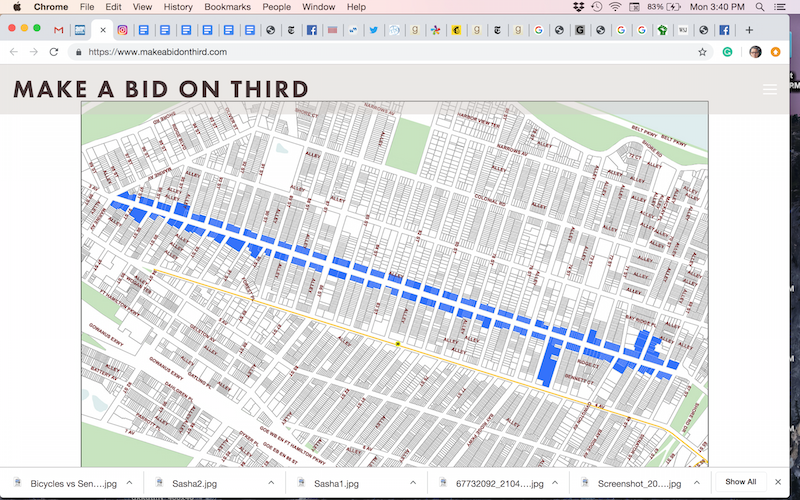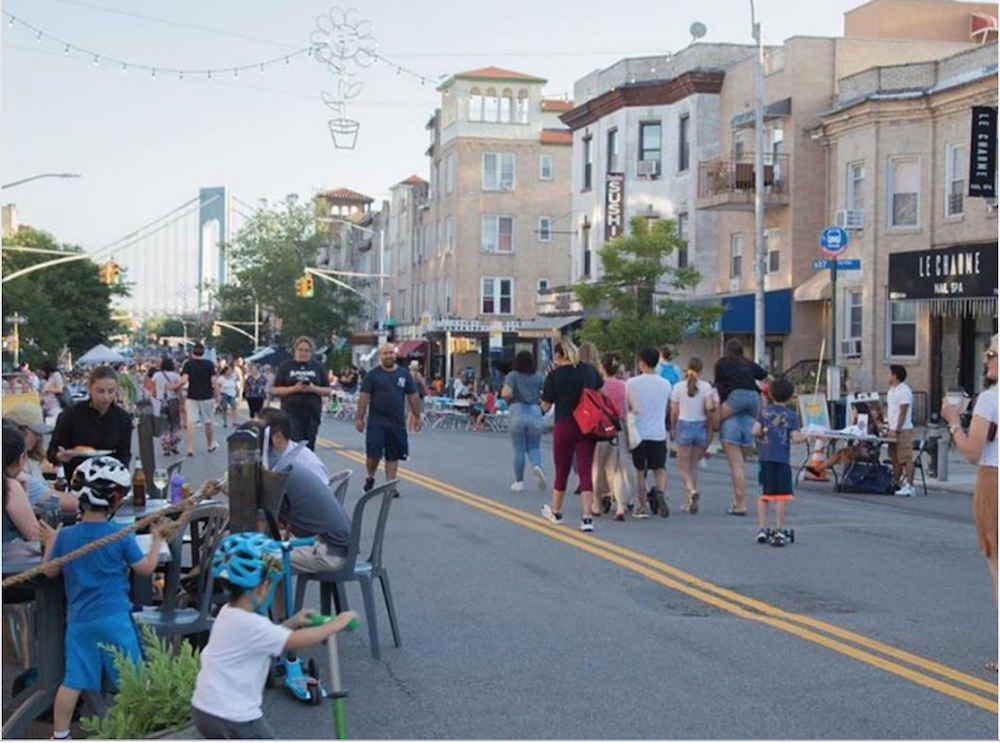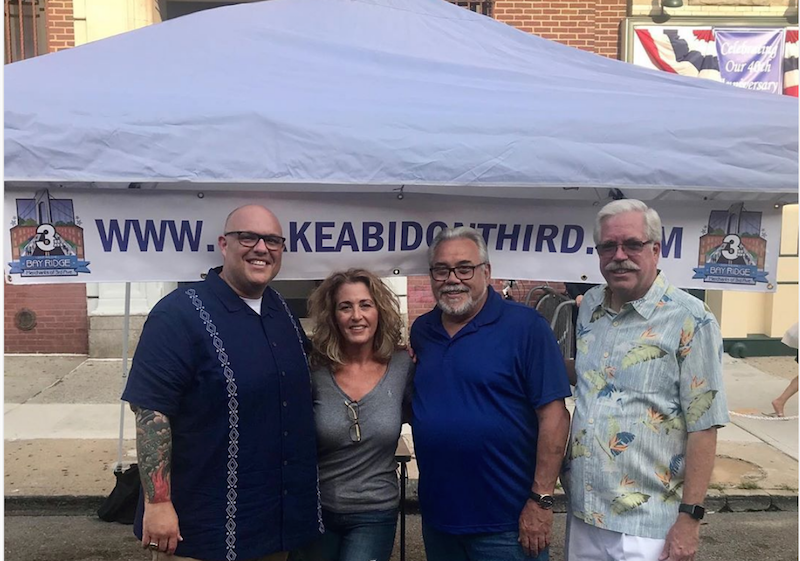Bay Ridge’s 3rd Avenue is home to hundreds of merchants, as well as multiple annual parades. To help organize those, maintain cleanliness, promote businesses and provide other services, some have proposed to create a Third Avenue Business Improvement District (BID).
But others say BIDS are just another tax that works sometimes to merchant and property owner’s advantageous and other times it does not.
Currently, there are 76 BIDs throughout the city, established beginning in 1981 to improve struggling commercial strips. They are created after “broad based” community support is established and work in partnership with the city’s Department of Small Business Services (SBS), according to the city and supporters of BIDS.
Merchants and landlords pay an assessment (a tax) for the BID, which in turn provides extra services for the area. BID budgets can range from less than $250,000 annually in places such as Sunset Park to over $5 million in Times Square.
The Bay Ridge BID’s proposed current budget is $560,000.
 So far, many local merchants and elected officials have signed on to the plan.
So far, many local merchants and elected officials have signed on to the plan.
“It’s my honor and privilege to help the merchants of Third Avenue explore the possibility of a BID along their corridor. The merchants already do great work, but a BID will have even more power to benefit local business owners, consumers and residents,” said City Councilman Justin Brannan (D-Bay Ridge, Dyker Heights, Bath Beach, Bensonhurst), who secured a grant to help fund the formation of the BID.
Other local Bay Ridge elected officials such as State Sen. Andrew Gounardes (D) and U.S. Rep. Max Rose support the initiative as well.
Previously, BIDs have faced opposition due to merchants being required to pay to maintain the BID’s budget. Longtime opponents cite BIDs as unnecessary and impossible to remove once established.
“We have a 311 system in place. We have a local community board in place. This is just another quasi-agency that wants to suck money out of the neighborhood,” said Edwin Cosme, a Coney Island resident who opposes a planned BID there.
But proponents argue that the BID would fill an important gap which volunteers had to fill over the years.
“The city does not hold festivals for us. The city does not do the summer strolls for us. The city does not do marketing for us. The city doesn’t hang the lights for us. This is all stuff that we’ve done over 25 years as volunteers,” said Robert Howe, President of the Third Avenue Merchants Association and co-chairman of the Bay Ridge 3rd Avenue Steering Committee. “Merchants have come up to me and they said, ‘We need marketing. We need better lights. We need some more foot traffic.’ And I say to them, ‘I’m a volunteer’. They’re asking for more stuff that we as volunteers can’t provide.”

Howe argues that the BID would provide fairness and have paid professionals do the work volunteers had otherwise been doing over the years.
“We can do more if everybody chips in. It’s really a sense of fairness,” he said. “We’re saying, ‘Everybody throw a few bucks in and let’s all work together.’”
An opponent of the BID created a website called “nobidon3rdave.com.” In it, the opponent cites issues with the BID in Chinatown and 5th Avenue. “Is 5th ave cleaner? Was it dirtier before the BID? No one keeps track,” reads one post on the website.
“The NY Chinatown BID needs more money to collect garbage. The monster’s appetite is never-ending! The 3rd Avenue BID is no different. It will consume your money wanting more year after year,” reads another.
But Howe counters it’s unfair to compare the proposed the Third Avenue BID to the Coney Island, Fifth Avenue and other BIDS.
“What do we have in common with Chinatown and Coney Island? Nothing. We’re a whole different entity,” said Howe.
But community activist Schellie Hagan, who opposed a BID in Clinton Hill and wrote about the ineffectiveness of the Fulton Street BID, said while she knows there are merchants in some BIDs such as the Atlantic and Myrtle Avenue that are happy, this isn’t always the case.
“If the stores are happy that’s great, but the problem with the way the BIDs are structured is that it’s just the luck of the draw. If you’re forced into a BID that’s bad, you’re skunked,” said Hagan, who opposed a BID in Clinton Hill and wrote about the ineffectiveness of the Fulton Street BID.
There are some concerns around BIDs being difficult to abolish and them not being representative organizations, but advocates insist that the BID is structured to be representative of merchant’s concerns and can be dissolved if needed.
“This will be a “you” organization, not a “those guys” organization — it is run by the Third Avenue community, not consultants, “outsiders”, or New York City employees. And the beauty of the BID is that everyone will contribute to the stability and enchantment of the Avenue,” reads the Steering Committee’s website. “The Board of Directors, who represent stakeholders in the district, can vote to initiate legislative action to dissolve a BID. Additionally, property owners can petition the city to dissolve the BID, if stakeholders feel the organization is no longer needed. Finally, the district’s city council representative can intervene and initiate a BID’s dissolution.”
Howe adds that 3rd Avenue is not in need for a BID due to economic struggle, but more due to economic competition with other gentrifying neighborhoods.
“Thirty, forty years ago Bay Ridge was sort of the center of restaurants and nightlife. Now it’s not anymore. You know the young people jump into Uber. ‘Where are you going?’ ‘I’m going to Bushwick. There’s a new place that just opened.’ ‘I’m going to Red Hook.’ ‘I’m going to Park Slope.’ We’re losing our own people to other areas that have Business Improvement Districts. So we’re going to try to keep those people in,” said Howe. “If you feel that things are going down, what do you do? The choice is to do something or do nothing.”
“I think that Bay Ridge needs a BID because 3rd avenue needs a revitalization. The empty storefronts are a telling story of the landscape of our avenue. Encourage locals to stay local,” wrote Ted Nugent, owner of Cebu Bar and Bistro.
“What [BID opponents] don’t realize is that they can run [the BID] if they want,” adds Howe. “So they’re kind of short-sighted. They’re like ‘We don’t want anything,’ But they don’t realize if we got something, they could be part of running it. But they set this up as an ‘us against them’. There’s no ‘us against them’. It’s ‘us’.”










